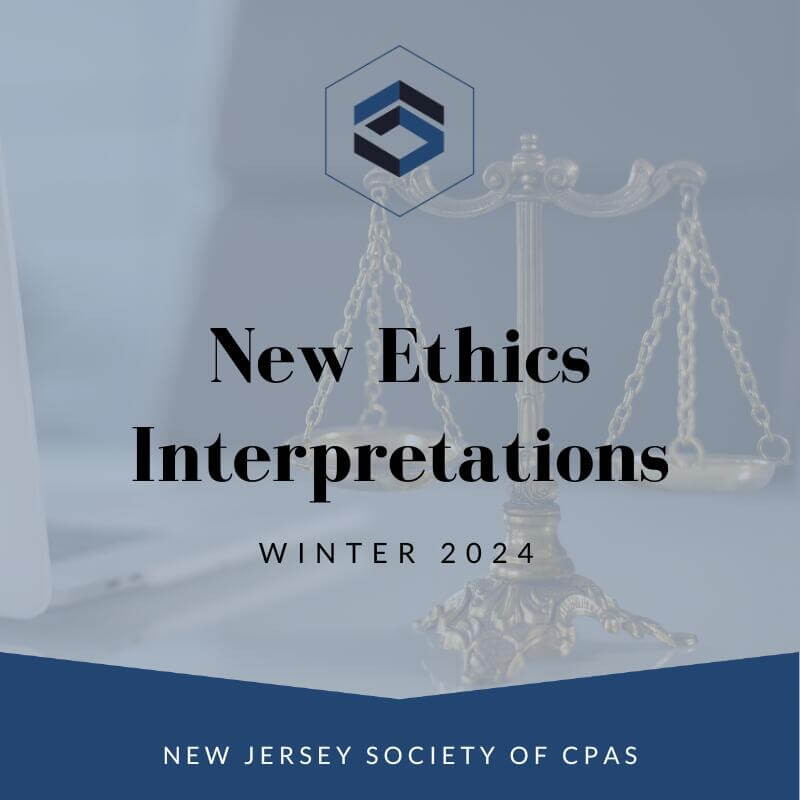The AICPA’s Professional Ethics Executive Committee (PEEC) recently issued two new ethics interpretations: the “Executive or Employee Recruiting” interpretation (ET sec. 1.295.135) and the “Tax Services” interpretation (ET sec. 1.295.160). These updates reflect global standards and address independence threats when firms provide recruiting or tax services to attest clients. These interpretations, especially crucial for smaller accounting firms, aim to mitigate risks when non-assurance services (NAS) are offered to audit clients. This article summarizes the key elements and implications of these new interpretations.
“Executive or Employee Recruiting” Interpretation
On June 10, 2024 PEEC issued the proposed “Executive or Employee Recruiting” interpretation to address threats to independence when members perform recruiting services for attest clients. This update, the first in more than 20 years, aligns with recent revisions by the International Ethics Standards Board for Accountants (IESBA) on recruiting services.
Key independence threats arise when members assist in hiring for key positions – especially those in senior management who influence financial reporting. Such roles pose undue influence and familiarity risks, given their proximity to engagement teams. To reduce these risks, PEEC has proposed new prohibitions: members are restricted from advising on specific employment terms, remuneration or related benefits of a particular candidate; searching for candidates; conducting reference checks; and recommending a single candidate for key roles at an attest client. These safeguards ensure that management’s hiring responsibilities remain separate from the auditor’s role.
PEEC also proposed stricter guidance from IESBA on candidate solicitation. The previous AICPA guidance allowed members to “solicit and screen candidates” based on client-approved criteria, but IESBA’s code prohibits “seeking out candidates” for key roles. PEEC adopted this phrasing for clarity and added a provision permitting members to search for candidates for non-key positions based on client-approved criteria.
An important distinction in the revised interpretation is that members may recommend multiple qualified candidates but are prohibited from recommending only one candidate for a key position. Members can advise clients on a candidate’s competence but must not directly influence hiring decisions or the final terms of employment for key positions. PEEC also addressed concerns over reference checks, proposing that auditors be prohibited from performing reference checks for key positions due to familiarity and undue influence threats, but allowing them to use professional judgment when conducting background checks for non-key roles. The proposed effective date for this interpretation is Jan. 1, 2026, with early adoption permitted.
“Tax Services” Interpretation
PEEC’s revisions to the “Tax Services” interpretation reflect changes in IESBA’s tax standards, specifically addressing independence threats when firms provide tax advisory and planning services to attest clients. One major concern is the advocacy threat, where a CPA might be perceived as advocating for a client’s tax position, potentially impairing independence.
Previously, the interpretation only covered tax return preparation and representation services, without guidance on tax advisory or planning services. The new proposed interpretation broadens the scope, providing factors to help auditors evaluate self-review and advocacy threats. These factors include the complexity of the tax regime, the degree of judgment involved, the materiality of the advice on the financial statements and the client’s tax expertise. The goal is to ensure auditors could avoid advocating for tax positions that could compromise their independence.
Additionally, the threshold PEEC proposes to use to convey when independence is not impaired when providing these services meets the “more likely than not” threshold, consistent with U.S. standards such as Public Company Accounting Oversight Board (PCAOB) Rule 3522 and Financial Accounting Standards Board (FASB) ASC 740. Auditors must ensure that any tax service they provide has at least a 50% likelihood of success based on technical merits. If this threshold cannot be met, independence is impaired.
The proposed revisions emphasize that providing general tax advice involving little subjectivity or where the tax treatment has been approved by authorities does not impair independence. However, if the tax treatment is uncertain or involves aggressive strategies, independence may be compromised unless the auditor is confident the treatment will likely be upheld. The new interpretation, when finalized, will take effect one year after its publication in the Journal of Accountancy, with early adoption encouraged.
Firms, particularly smaller ones, should familiarize themselves with these revisions to ensure compliance and avoid impairing independence when offering these non-assurance services to attest clients. These changes will take effect over the next few years, providing ample time for firms to adapt their practices accordingly.


